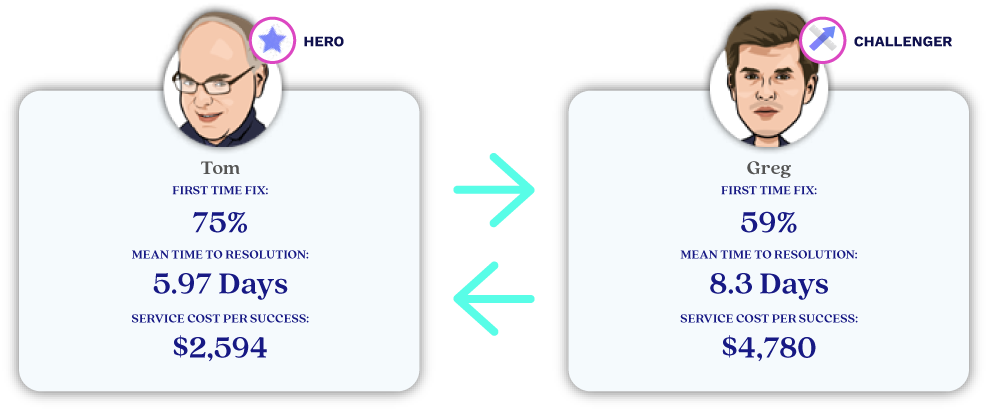The race is on for field service organizations to bridge the skills gap, meet customer demands, tame complex machinery, and ride the tech wave — all at the same time.
Hot off the press, Aquant’s 2024 Field Service Benchmark Report uncovers how a widening skills gap and increasing costs impact today’s service orgs. It also dives deep into how top-performing companies use data, AI, and the Shift Left Method to adapt to the changing times and build service teams equipped for the present and future.
We gathered and analyzed actual, anonymized data from:
- 145 service organizations, including service divisions within OEMs and third-party service organizations across manufacturing, medical devices, commercial printing, industrial machinery, food service equipment, and more
- More than 24 million work orders spanning 6.6+ million assets
- Over 582,000 technicians
- Nearly $7.71 billion in service costs
- An average of 3 years of service data per company
This year, we uncovered:
- The skills gap is the root of many challenges, including skyrocketing service costs. On average, bottom performers cost 34% more than the highest performers at top-ranking service organizations. But at bottom-performing orgs, low-performing employees can cost 80% more than their top-performing counterparts. Additionally, bottom-performing companies take four times longer to resolve an issue and have three times more Visits Per Asset than their top-performing counterparts. The good news: if every employee had the knowledge and skills to perform like the top 20% of the workforce, service costs would be reduced by as much as 22%.
- Top-performing organizations are pulling ahead of their lower-performing peers mainly because they have a smaller workforce skills gap. They have higher First Time Fix Rates among their workers. Top-performing organizations also have lower service costs, with only a slight difference between top and bottom performers. Additionally, they typically have more time between visits, which signals fewer visits needed for repairs or addressing maintenance issues.
- Companies need to pay attention to their Customer Experience Gaps. Companies who measure First Time Fix Rates in 7-day or 14-day windows are setting the stage for a significant gap, leading to frustrating customer experiences. When measured in short windows, it becomes easy to overestimate First Time Fix Rates and underestimate Resolution Costs. We recommend measuring First Time Fix Rates in 30 days, prioritizing upskilling, and making every service team member equally knowledgeable about equipment and best practices.
- Best-in-class organizations are getting ahead and staying competitive through data, tools, and the Shift Left method. Their best practices include:
- Regularly reviewing their organization’s performance.
- Using quantitative and qualitative data from multiple sources to understand their service landscape.
- Normalizing data sanitation.
- Starting with their existing data and refining outputs to get better results.
- Adopting and implementing the Shift Left approach, which moves service resolutions closer to the end customer so they don’t need to contact the company until necessary.
- Assembling a workforce with diverse soft and hard skills to create a better customer experience—and committing to upskilling teams.
How does your org stack up against 2024’s service benchmarks?
Participate in Aquant’s 7 Day Challenge to find out — at no cost.
Our analysts will process and analyze your data via Aquant’s robust AI engine. We’ll show you the results of your org’s key metrics (including First Time Fix Rate), how you can be more efficient, and where to save money.
Use your data to uncover the most significant opportunities for performance improvement and see how Shifting Left can help your org stay ahead of the competition.
NEW YORK (Oct. 6, 2021) — Aquant, the leading Service Intelligence Platform that gives service leaders, reps and teams the most vital information they need for every situation, has raised $70 million in Series C funding. The investment will support the growth and advance its industry-leading service intelligence technology.
The funding round was led by Qumra Capital, Insight Partners and Pitango Growth. Previous investors Lightspeed Venture Partners and Angular Ventures also participated in the round, along with new investors Schneider Electric Ventures and Claltech.
Aquant has now raised a total of $110 million. The company will use the fresh capital to support its rapid growth and expand use cases as it strengthens its position as the service intelligence leader in every market for every company that provides service. To accelerate its global expansion, Aquant will grow its engineering, client services and go-to-market teams, adding positions in the US, Europe and Israel. The funding will also drive the continuous innovation of its Artificial Intelligence platform, including the development of cutting-edge technology that combines structured and unstructured data and harnesses the tribal knowledge of experts.
“To win the service game today, it’s not enough to just solve problems anymore,” said Shahar Chen, CEO and co-founder of Aquant. “Companies must also provide a stellar service experience. And when providing a stellar experience, service becomes more than just ‘maintenance’ for customers – it becomes magic.”
Using deep service expertise and specialized Natural Language Processing (NLP), Aquant understands all service data, combines it with tribal knowledge, and provides service leaders, technicians, and reps with the most vital information they need, exactly when they need it.
Service has largely remained the same for decades, but is now at a turning point. Companies are seeking to transform the way they deliver service, with service leaders expected to deliver exceptional service to differentiate the brand. They are also being asked to provide customer insights, derived from service data, to help executives and front line managers make strategic business decisions across all lines of business, including service, product development, sales, and more.
Aquant’s rapid growth is a direct result of how it’s helping companies of all sizes make these transformative changes. The company gives service leaders needed insights into their business, enabling them to make proactive, data-driven decisions, identify at-risk customers, understand asset performance, identify compliance risks, and more. The AI-powered technology is also helping to erase the talent shortage by providing the entire workforce access to information that was previously siloed in databases or held in the minds of long-tenured technicians.
Leading market researchers like Gartner Research have noted the unfulfilled need to leverage service intelligence throughout the industry, citing the powerful potential of machine learning and data mining to increase field service efficiency.
Aquant’s proprietary service intelligence platform harnesses Artificial Intelligence to ingest unstructured data, tribal knowledge, and industry insights. This combination gives service leaders meaningful insights into the state of their organization, enabling them to make data-driven decisions. It also empowers service technicians to be at the right place with the right knowledge and the right parts at the right time to solve technical problems immediately. Making every Aquant-powered customer experience a magical service interaction.
“Aquant is revolutionizing service intelligence and is well-positioned to lead this large market given their domain expertise and data savviness. Their technology enables companies to focus on what they’re good at, alleviating one of the most serious business challenges today,” said Sivan Shamri Dahan, managing partner at Qumra Capital. “We’re very excited to partner with them as they continue their rapid growth in order to significantly improve service experiences.”
Service intelligence solves an increasingly problematic talent shortage in the field service industry, providing new hires access to decades of technical knowledge, account data and service history at their fingertips. As Baby Boomers continue to retire from technician roles and younger Millennial and Generation Z employees fill their positions, sharing knowledge and employing data effectively will be increasingly important.
“Customers trust Aquant’s AI-enabled offering, as unlike generic AI solutions, it is tailored to the service vertical’s needs and delivers clear ROI from day one,” said Idit Muallem-Yedid, partner at Pitango Growth, who’s joining Aquant’s Board. “Aquant’s insights shed light on areas traditionally perceived as blind spots in service operations and experience. I am excited to be part of Aquant’s journey, as it continues to bring value to all stakeholders of the service experience and roll out additional solutions highly anticipated by its customers.”
“We look forward to working with our new investors as we enter an important growth phase,” said Assaf Melochna, president and co-founder of Aquant. “The service industry is on the cusp of once-in-a-lifetime advancements, and helping these companies transform service by providing critical business insights is built into Aquant’s DNA.”
The company works across a number of industries, including medical device manufacturers, food equipment manufacturers, capital equipment manufacturers, industrial automation and appliances. Its clients include Siemens Healthineers, The Home Depot, 3D Systems, and Sysmex, among others.
About Aquant:
Aquant’s service intelligence platform gives service leaders, reps and teams the most vital information they need for every situation. Aquant understands service data in context, automatically transforms unstructured data into structured data, and then predicts the best solution for every service challenge. So service goes from simply solving problems to creating entirely new business opportunities, and from putting out fires, to lighting up customers’ smiles and igniting lasting loyalty. Now, service leaders completely eliminate escalations, technicians solve every service problem and together make service feel like magic. Visit www.aquant.ai to learn more.
Media Contact:
Lauren Meckstroth
[email protected]
702.499.7388



